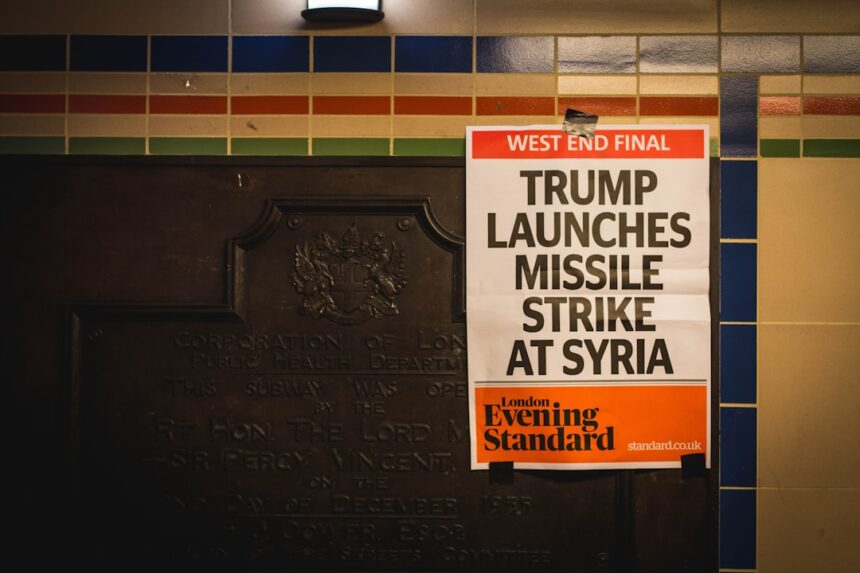Private Military Companies (PMCs) have emerged as significant players in the realm of international relations, particularly in the context of U.S. foreign policy. These entities, often characterized by their provision of military services, security, and logistical support, have become increasingly integrated into the fabric of American military operations abroad.
As the United States navigates complex geopolitical landscapes, PMCs offer a flexible and often cost-effective means of addressing security challenges. The role of PMCs in U.S.
foreign policy is multifaceted, encompassing a range of activities from direct combat support to training local forces and providing intelligence services. Their involvement has sparked considerable debate regarding the implications for accountability, effectiveness, and ethical considerations in military engagements. As the U.S.
continues to confront asymmetric threats and engage in counterinsurgency operations, understanding the dynamics of PMCs becomes essential for comprehending contemporary foreign policy strategies.
Key Takeaways
- PMCs play a significant role in US foreign policy, providing support for military operations and security services.
- The history of PMCs in US foreign policy dates back to the Vietnam War, and has evolved to include a wide range of services in conflict zones.
- Advantages of using PMCs include flexibility, cost-effectiveness, and specialized expertise, while disadvantages include lack of accountability and potential for human rights abuses.
- PMCs have had a significant impact on military intervention and conflict resolution, often operating in complex and sensitive environments.
- Ethical and legal considerations of using PMCs in foreign policy include concerns about accountability, transparency, and adherence to international law.
The history and evolution of PMCs in US foreign policy
The history of PMCs in U.S. foreign policy can be traced back to the late 20th century, with notable instances such as the use of contractors during the Vietnam War. However, it was not until the post-9/11 era that their role expanded significantly.
The wars in Iraq and Afghanistan saw a dramatic increase in the reliance on private military contractors, as the U.S. government sought to augment its military capabilities without committing additional troops. This shift marked a pivotal moment in the evolution of PMCs, as they transitioned from auxiliary support roles to integral components of military operations.
Over time, PMCs have diversified their services beyond traditional combat roles. They now engage in a variety of functions, including logistics, intelligence analysis, and training of foreign military personnel. This evolution reflects a broader trend towards outsourcing military functions, driven by the need for rapid deployment and operational flexibility.
As PMCs have gained prominence, they have also faced scrutiny regarding their accountability and oversight, leading to calls for greater regulation and transparency in their operations.
The advantages and disadvantages of using PMCs in foreign policy
The use of PMCs in U.S. foreign policy presents several advantages that appeal to policymakers seeking efficient solutions to complex security challenges. One significant benefit is the ability to deploy specialized skills and expertise quickly.
PMCs often employ former military personnel with extensive experience, allowing them to provide immediate support in crisis situations. This rapid response capability can be crucial in environments where time is of the essence, such as during humanitarian interventions or counterterrorism operations. However, the reliance on PMCs also raises substantial disadvantages that cannot be overlooked.
One major concern is the lack of accountability associated with private contractors. Unlike regular military personnel who are subject to military law and oversight, PMCs operate under different legal frameworks, which can lead to issues regarding transparency and adherence to ethical standards. Incidents involving contractor misconduct have sparked public outrage and raised questions about the effectiveness of oversight mechanisms in place to regulate their actions.
The impact of PMCs on military intervention and conflict resolution
| Metrics | Impact |
|---|---|
| Number of PMCs deployed | Correlates with increased military intervention |
| PMC casualties | Can affect public opinion and political will for intervention |
| Cost of hiring PMCs | Can be more cost-effective than deploying regular military forces |
| Effectiveness of PMCs in conflict resolution | Varies depending on training and regulations |
PMCs have significantly influenced the landscape of military intervention and conflict resolution in U.S. foreign policy. Their presence allows for a more flexible approach to military engagements, enabling the U.S.
to respond swiftly to emerging threats without the political ramifications associated with deploying conventional forces.
However, the involvement of PMCs can also complicate conflict resolution efforts.
The presence of private contractors may blur the lines between military objectives and corporate interests, leading to potential conflicts of interest that undermine diplomatic initiatives. Additionally, reliance on PMCs can create a perception among local populations that foreign interventions are driven by profit motives rather than genuine humanitarian or security concerns. This perception can hinder efforts to build trust and foster cooperation with local communities, ultimately complicating long-term conflict resolution strategies.
The ethical and legal considerations of using PMCs in foreign policy
The ethical and legal implications of employing PMCs in U.S. foreign policy are complex and multifaceted. On one hand, proponents argue that PMCs can enhance operational efficiency and provide necessary support in challenging environments.
On the other hand, critics raise concerns about accountability, oversight, and adherence to international law. The lack of clear legal frameworks governing PMC operations can lead to situations where contractors operate with impunity, raising ethical questions about their conduct in conflict zones. Moreover, incidents involving contractor misconduct have highlighted the need for greater scrutiny and regulation of PMCs.
High-profile cases of abuse or excessive use of force have prompted calls for reforms aimed at ensuring accountability for private contractors operating in war zones. The challenge lies in balancing the operational advantages offered by PMCs with the imperative to uphold ethical standards and protect human rights in military engagements.
The economic implications of relying on PMCs for military operations
The economic implications of relying on PMCs for military operations are significant and warrant careful consideration. On one hand, outsourcing military functions can lead to cost savings for the government by reducing personnel expenses associated with maintaining a standing army. By leveraging private contractors, the U.S.
can access specialized skills without incurring long-term commitments associated with traditional military deployments. However, this reliance on PMCs also raises concerns about long-term sustainability and accountability in defense spending. Critics argue that privatization can lead to inflated costs due to profit motives driving contractor pricing structures.
Additionally, the lack of transparency in PMC contracts can make it challenging for policymakers to assess the true costs associated with outsourcing military functions. As such, while PMCs may offer short-term economic benefits, their long-term impact on defense budgets and resource allocation remains a contentious issue.
The influence of PMCs on US relationships with other countries
The presence of PMCs can significantly influence U.S. relationships with other countries, both positively and negatively. On one hand, PMCs can facilitate partnerships by providing training and support to allied forces, thereby strengthening bilateral ties and enhancing regional security cooperation.
By assisting foreign militaries in building capacity, PMCs can contribute to stability in conflict-prone regions and foster goodwill among partner nations. Conversely, the use of PMCs can also strain diplomatic relations if local populations perceive their presence as an infringement on sovereignty or an extension of American imperialism. Incidents involving contractor misconduct can exacerbate tensions between the U.S.
and host nations, leading to calls for greater oversight or even expulsion of foreign contractors. As such, while PMCs can serve as tools for enhancing security cooperation, their impact on diplomatic relations must be carefully managed to avoid unintended consequences.
The role of PMCs in intelligence gathering and covert operations
PMCs have increasingly taken on roles traditionally associated with intelligence agencies, particularly in areas such as intelligence gathering and covert operations. Their ability to operate discreetly allows them to gather information in environments where official government presence may be limited or politically sensitive. This capability has made them valuable assets for U.S.
intelligence efforts, particularly in regions characterized by instability or conflict. However, the involvement of PMCs in intelligence operations raises significant ethical and legal questions regarding accountability and oversight. The lack of clear guidelines governing their activities can lead to situations where contractors operate outside established norms or engage in practices that contravene international law.
As intelligence operations become more reliant on private contractors, ensuring accountability becomes paramount to maintaining public trust and upholding democratic principles.
The potential for PMCs to shape US foreign policy objectives
The increasing prominence of PMCs has the potential to shape U.S. foreign policy objectives in profound ways. As these entities become more integrated into military operations and intelligence efforts, they may influence decision-making processes regarding intervention strategies and resource allocation.
Their expertise and operational capabilities can provide policymakers with valuable insights into emerging threats and opportunities for engagement. However, this influence also raises concerns about the potential for corporate interests to overshadow national security priorities. As PMCs operate within a profit-driven framework, there is a risk that their objectives may not align with broader U.S.
foreign policy goals. This dynamic underscores the need for careful oversight and regulation to ensure that PMC activities remain aligned with national interests rather than being driven solely by profit motives.
The future of PMCs in US foreign policy and potential challenges
The future of PMCs in U.S. foreign policy is likely to be shaped by ongoing debates surrounding accountability, regulation, and ethical considerations. As global security challenges continue to evolve, the demand for flexible and responsive military solutions will likely persist, ensuring that PMCs remain relevant players in international relations.
However, this relevance comes with significant challenges that must be addressed. One major challenge is establishing clear legal frameworks governing PMC operations to ensure accountability and adherence to ethical standards. As incidents involving contractor misconduct continue to surface, calls for reform will likely intensify, prompting policymakers to reevaluate existing oversight mechanisms.
Additionally, as public scrutiny increases regarding the use of private contractors in military operations, there may be growing pressure for greater transparency in PMC activities.
assessing the overall impact of PMCs on US foreign policy
In conclusion, Private Military Companies have become integral components of U.S. foreign policy, influencing military interventions, conflict resolution efforts, and diplomatic relations worldwide. While they offer distinct advantages such as rapid deployment capabilities and specialized expertise, their involvement also raises significant ethical and legal concerns that cannot be ignored.
As policymakers navigate the complexities associated with relying on PMCs for military operations, it is essential to strike a balance between operational efficiency and accountability. The future trajectory of PMCs will depend on how effectively these challenges are addressed through regulatory reforms and oversight mechanisms aimed at ensuring responsible conduct in conflict zones. Ultimately, assessing the overall impact of PMCs on U.S.
foreign policy requires a nuanced understanding of their roles within broader strategic frameworks while remaining vigilant about potential pitfalls associated with privatization in defense operations.
The rise of Private Military Companies (PMCs) has significantly influenced the trajectory of U.S. foreign policy, introducing new dynamics in military operations and international relations. These entities have not only altered the traditional landscape of warfare but have also raised questions about accountability and the privatization of military force. For a deeper understanding of how PMCs have reshaped strategic decisions and their implications on global politics, you can explore a related article on this topic by visiting In The War Room. This resource provides comprehensive insights into the evolving role of PMCs and their impact on contemporary foreign policy.
WATCH THIS! From Tehran to Blackwater: The Real Story
FAQs
What are PMCs?
PMCs, or Private Military Companies, are private companies that provide military and security services to governments and other organizations. These services can include combat operations, training, logistics, and security.
How have PMCs changed US foreign policy?
PMCs have changed US foreign policy by providing the government with additional options for military and security operations. They have been used in conflicts such as the wars in Iraq and Afghanistan, and have allowed the US to supplement its military forces with private contractors.
What are some criticisms of PMCs?
Critics of PMCs argue that they can operate with less oversight and accountability than regular military forces, leading to potential human rights abuses and other ethical concerns. There are also concerns about the potential for PMCs to influence foreign policy decisions for their own financial gain.
How are PMCs regulated?
PMCs are regulated through a combination of international law, national laws, and industry standards. However, there is ongoing debate about the adequacy of these regulations and the need for greater oversight of PMC activities.




